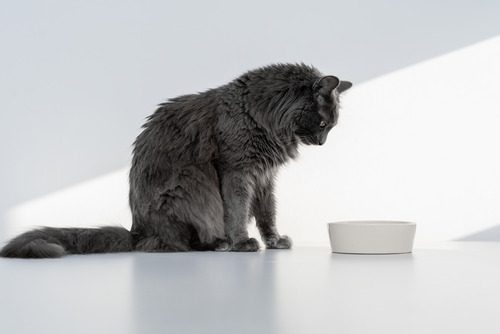Feline infectious anemia is a blood disorder in cats caused by a type of bacteria that attaches to red blood cells, leading to their destruction. This condition can result in anemia, which means the cat has fewer healthy red blood cells to carry oxygen throughout the body. Cats with feline infectious anemia may experience weakness, weight loss, pale gums, and lethargy. Because this disease can affect cats of all ages and backgrounds, it’s important for pet owners to understand what feline infectious anemia is, how it develops, and why veterinary care is essential. If you ever notice concerning changes in your cat’s health, the team at Millis Animal Hospital in Millis, MA can help. Call us at 508-376-5317 or schedule an appointment online to get your cat the care they need.

Understanding Feline Infectious Anemia
Feline infectious anemia is primarily linked to a group of bacteria known as Mycoplasma haemofelis and related organisms. These bacteria attach themselves to red blood cells in a cat’s bloodstream. Once attached, the body may recognize the infected cells as foreign and destroy them, leading to anemia.
Because anemia limits the amount of oxygen delivered to tissues, cats with this condition often appear tired or weak. In more severe cases, feline infectious anemia can become life-threatening if left untreated. Veterinary diagnosis and management are vital to protecting a cat’s long-term health.
What Causes Feline Infectious Anemia?
Feline infectious anemia can develop for several reasons, but the condition always begins with the bacteria entering the cat’s bloodstream. There are a few main ways this happens:
Blood-Sucking Parasites
Parasites such as fleas and ticks can carry the bacteria responsible for feline infectious anemia. When they feed on a cat’s blood, they can transmit the infection. This is one reason parasite prevention plays such a key role in feline health.
Cat Fights and Bites
Outdoor cats are at a higher risk of contracting feline infectious anemia through bites from other cats. If an infected cat bites another, the bacteria may spread through the wound.
Transmission from Mother to Kittens
In some cases, an infected mother can pass the bacteria to her kittens during pregnancy or birth.
Other Contributing Factors
Cats with weakened immune systems are more vulnerable. Stress, illness, or underlying conditions can increase the likelihood of developing more severe symptoms if exposed to the bacteria.
Symptoms of Feline Infectious Anemia
Cats with feline infectious anemia may show a variety of symptoms, some of which can appear mild at first but progress over time. These include:
- Pale gums or tongue due to low red blood cell count
- Fatigue or reluctance to play and move
- Weight loss despite normal eating habits
- Loss of appetite
- Fever in some cases
- Enlarged spleen or lymph nodes
In advanced cases, a cat may show signs of rapid breathing, jaundice (yellowing of the skin or eyes), or even collapse. Because these symptoms overlap with other illnesses, professional veterinary evaluation is the only way to determine whether feline infectious anemia is the cause.
How Vets Identify Feline Infectious Anemia
When a cat is showing concerning symptoms, veterinarians at Millis Animal Hospital perform a series of diagnostic tests to check for feline infectious anemia.
Physical Examination
The first step involves a full examination to look for outward signs such as pale gums, weight loss, or an enlarged spleen.
Blood Tests
Blood tests play the biggest role in diagnosing feline infectious anemia. These include:
- Complete Blood Count (CBC): Measures red and white blood cell levels, which can confirm anemia.
- PCR Testing: Detects the DNA of the bacteria that causes the condition, making it one of the most accurate diagnostic methods.
Differential Diagnosis
Because other diseases can mimic the symptoms of feline infectious anemia, veterinarians may run additional tests to rule out other causes such as kidney disease, feline leukemia virus (FeLV), or feline immunodeficiency virus (FIV).
Managing Feline Infectious Anemia
Once diagnosed, your veterinarian creates a tailored treatment plan to manage feline infectious anemia. The exact approach depends on the severity of the anemia, the cat’s age, and any underlying conditions.
Antibiotic Therapy
Antibiotics are commonly prescribed to help control the bacterial infection and reduce the number of organisms in the bloodstream.
Supportive Care
Cats with moderate to severe anemia may require additional care such as fluid therapy, nutritional support, or oxygen therapy.
Blood Transfusions
In the most severe cases, a blood transfusion may be necessary to stabilize the cat until other treatments begin to take effect. Ongoing monitoring is essential, as feline infectious anemia can sometimes recur. Cats may require follow-up visits to ensure their blood cell counts remain stable.
What You Can Do to Help Prevent Feline Infectious Anemia
Prevention focuses on limiting exposure to the bacteria and reducing the risk of transmission.
Flea and Tick Prevention
Keeping cats on year-round parasite prevention is one of the most effective ways to lower the risk. Fleas and ticks are known carriers of the bacteria, so consistent preventive care is key.
Indoor Living
Cats that live primarily indoors are at a much lower risk of contracting feline infectious anemia. They are less likely to be bitten by other cats or exposed to infected parasites.
Regular Veterinary Checkups
Routine wellness exams provide opportunities for early detection of health concerns. Regular blood work can catch anemia or infection before it becomes severe.
Long-Term Outlook for Cats with Feline Infectious Anemia
With proper veterinary care, many cats diagnosed with feline infectious anemia can recover and go on to live healthy lives. However, some cats may carry the bacteria long-term and experience relapses. Cats with weakened immune systems may face more challenges in fighting the infection. Because the condition can vary in severity, staying connected with your veterinarian is essential. Regular checkups and ongoing monitoring provide the best chance for long-term stability and comfort for your cat.
Where to Turn for Cat Care in Millis, MA
Understanding feline infectious anemia gives cat owners the knowledge they need to recognize warning signs and act quickly. Early diagnosis and professional veterinary care make all the difference in protecting your cat’s health. If your cat shows any changes in energy, appetite, or overall behavior, reach out to Millis Animal Hospital in Millis, MA. Call 508-376-5317 or make an appointment online today to schedule a thorough examination. Our team is here to provide the support and care your cat deserves.
Recent Posts
About Us
Millis Animal Hospital is a privately owned AAHA-accredited, Cat-Friendly Certified practice staffed with Fear Free Certified professionals. We know a thing or two about treating pets and their families the way they deserve, with excellent preventive care and surgical services tailored to your individual needs.
